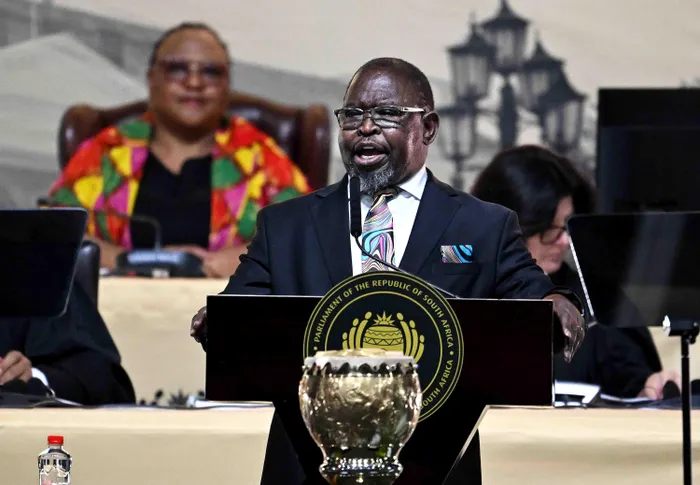S&P Global revises South Africa’s growth forecast down but remains optimistic on reforms
CREDIT RATINGS

Finance Minister Enoch Godongwana will table the National Budget Review for the third attempt in Parliament on Wednesday after tensions within the Government of National Unity coalition over an increase in value-added tax (VAT) rates led to the budget being amended and re-tabled three times.
Image: File
S&P Global Ratings has lowered its economic growth forecast for South Africa while expressing cautious optimism regarding the country’s reform initiatives and efforts towards fiscal consolidation, even amid ongoing tensions within the coalition government.
This comes as the government has launched the second phase of "Operation Vulindlela," which goes beyond improving energy and infrastructure to address local government issues and enhance digitalization of the economy.
The ratings agency on Friday maintained South Africa’s subinvestment status, affirming the country’s long term foreign and local currency debt ratings at ‘BB-’ and ‘BB’, respectively, with a positive outlook.
S&P said the positive outlook reflected the potential for stronger growth than it currently expected, despite trade- and tariff-related headwinds, alongside government debt consolidation, “if the coalition government can accelerate economic and fiscal reforms while addressing infrastructure pressures”.
It added that the ratings on South Africa benefited from the country's sizable and sophisticated financial system that provides a deep funding base for the government.
S&P said the country also has relatively strong institutions, with good checks and balances, particularly its central bank, the South African Reserve Bank (SARB).
However, the ratings were constrained by relatively low gross domestic product (GDP) per capita and low GDP growth rates, as well as sizable fiscal deficits and high government debt.
Finance Minister Enoch Godongwana will table the National Budget Review for the third attempt in Parliament on Wednesday after tensions within the Government of National Unity coalition over an increase in value-added tax (VAT) rates led to the budget being amended and re-tabled three times.
However, S&P said the budget was likely to be passed without the earlier planned increase in the VAT rate, as well as with broadly commensurate cuts to departmental expenditure allocations, which will counterbalance the loss of the planned VAT revenue increase.
“Overall, over the medium term, we expect the government to continue efforts toward its planned fiscal consolidation, though downside risks to implementation remain,” S&P said.
S&P is now expecting South Africa's GDP growth to rise to an average of 1.5% over 2025-2028 after a subdued 0.6% in 2024, but cautioned that ongoing logistical bottlenecks and global tariff-related pressures will constrain economic activity.
“We expect real GDP growth to pick up slightly to 1.3% this year from 0.6% in fiscal 2024, as more private sector-driven electricity supply comes onstream, and last year's drought was not repeated. But growth will be limited by potential US tariffs and global tariff-related risks, both via direct and secondary effects such as slowing demand from China for key commodities,” it said.
“We forecast a slight rebound in growth from 2024 levels (but lower than our November forecast) of 1.5% on average over fiscal 2026-2028, partly supported by likely lower interest rates, as well as the recent establishment of a two-pot retirement system that allows people to partially withdraw funds from their retirement accounts, which could boost consumption.”
Despite this, S&P is forecasting gross general government debt to remain high, averaging 80% of GDP in fiscal 2025-2028, higher than the National Treasury’s estimate of an all-time high of 76.2% of GDP in 2025/26.
In response to the S&P rating, the National Treasury said it was committed to a balanced fiscal strategy.
“Government’s growth strategy will continue to focus on maintaining macroeconomic stability to reduce living costs and grow investment, executing reforms to promote a more dynamic economy, building state capability in core functions and supporting growth-enhancing public infrastructure investment.
“The fiscal strategy continues to strike a balance between stabilising the public finances, reducing risks in the fiscal framework, encouraging economic growth and supporting low income and vulnerable households.”
BUSINESS REPORT